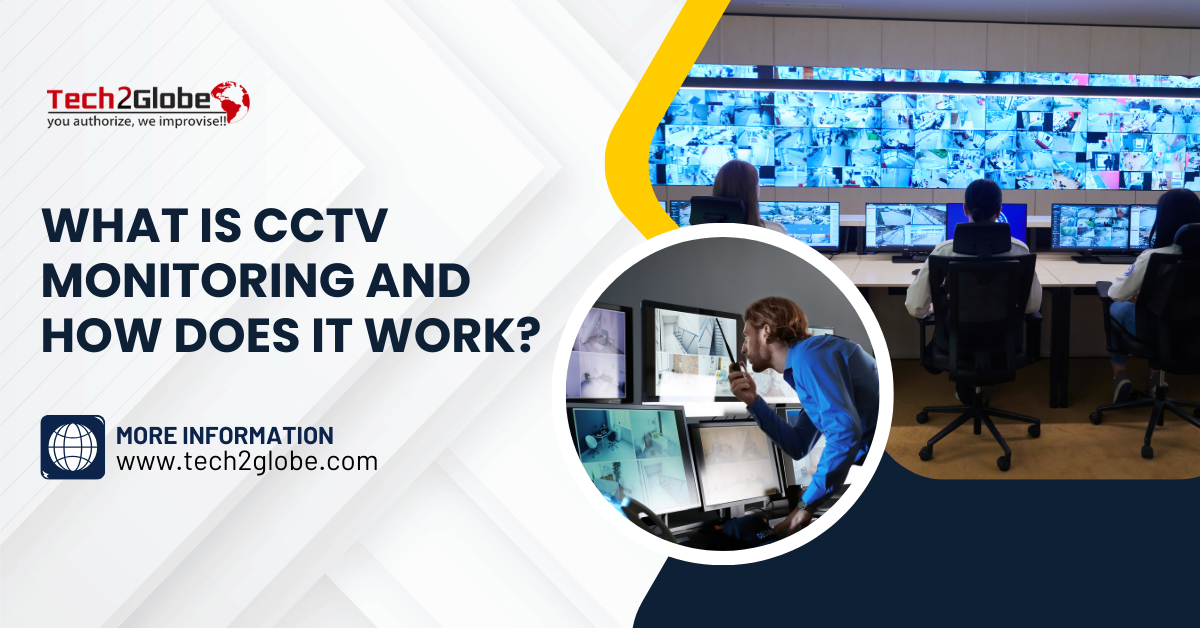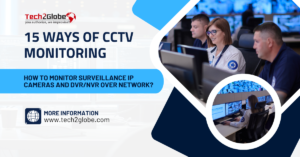One of the most commonly asked questions is, ‘How does CCTV monitoring work?‘ CCTV monitoring is, as the name implies, a service in which security cameras on your site, land, or property are monitored by qualified personnel in advance of any illegal activity.
Having CCTV surveillance in public and private places has shown to be an effective technique for preventing and solving crimes. The rational choice theory and routine activity theory both support the idea that formal monitoring reduces crime by providing improved supervision. CCTV monitoring has been demonstrated to reduce crime more than unmonitored or manned CCTV systems.
In this article, we’ll discuss one of the most important aspects of CCTV Monitoring Services . Coupling cutting-edge CCTV equipment with trained security personnel opens up a world of new possibilities and amenities.
What is CCTV Monitoring
The concept behind CCTV Monitoring Service is simple: it involves keeping a watch on a CCTV system. An ARC (Alarm Receiving Centre), a professional third-party monitoring agency, would connect to a site’s security and CCTV systems and closely monitor them in the event of any triggers or alerts. If this occurs, the monitoring service will be notified immediately. It will take the required measures to establish whether the trigger is a false alarm (which might be caused by a malfunction, personnel mistake, or a wild animal) and, if so, call the appropriate authorities.
How does CCTV monitoring work?
The CCTV monitoring system is strategically placed in areas requiring surveillance, such as entrances, exits, corridors, or outdoor spaces, based on the assessment of security needs.
Stage 1: Setting alarm response protocols
To manage your CCTV monitoring, assess the triggers you want our team to manage, which can be site-specific or based on your existing cameras. Advanced surveillance technology can alert you to out-of-place items, movement or intrusions outside working hours, and alarm signals related to broken glass, lock tampering, or other signs of criminal activity. This comprehensive coverage ensures your property is protected and safe.
Stage 2: An Alarm is triggered by a security breach
When a signal is sent to the ARC, operators filter out false alarms and remotely access cameras or other on-site assets to decide whether a real threat exists.
If an alarm cannot be determined or occurs during business hours, the operative will contact the site manager, mobile patrol team, or keyholder to determine if the alarm is a genuine concern.
Alarm activation outside of working hours or signals of an emergency may necessitate summoning security responders or coordinating with the police or other emergency services while alerting the site owner of the growing situation.
Stage 3: Alarm response and action
CCTV monitoring systems allow clients to specify actions for alarm responders based on the incident’s nature and severity. A bespoke monitoring contract is recommended, aligning with key threats and areas of highest risk. This includes contacting the designated keyholder, reaching emergency services immediately, and collaborating with on-site security teams to communicate directly with the police. Different organizations have varying requirements for monitoring.
How can corrective actions be implemented using CCTV footage?
Utilizing CCTV footage enables swift corrective actions to address security incidents effectively.
Talk to the key holder
When a CCTV alarm goes out, the usual response is to notify the site’s designated key holder, usually the site manager. When a trigger occurs, the CCTV Monitoring Service personnel usually phone this number first to see if it is a false alarm. Suppose the CCTV footage reveals that the occurrence is an emergency. In that case, the operatives may contact the keyholder immediately to advise them of the issue and escalate the response to an emergency response.
Audio Challenge
When security personnel are conducting a challenge, they may use a surveillance camera built-in or external speakers to provide an audible message. If the CCTV system has this functionality, the message might be pre-recorded or a live message from the operatives. This reaction is typical in cases involving intruders, trespassers, or vandals. The person can be warned that their actions are being captured by CCTV monitoring companies and asked to leave the premises immediately. This form of response aims to prevent criminal activity and apprehend perpetrators as soon as possible.
Protection Agency/Emergency Response Group
CCTV Monitoring Service also offers private security guards or a rapid response squad to check the premises. They will keep off intruders, discourage criminal activity, and verify the site’s continued safety.
Police Response
When surveillance cameras are in place, the operators can swiftly call the police if they determine it is necessary. This ensures that police resources are well-spent, allowing them to focus on cases requiring their attention. Since they are not personally invested in the site, monitoring operators can make decisions quickly and efficiently, even under duress.
The Need to deploy CCTV
CCTV is widely recognized for its benefits, but its main reasons for its vitality for building security remain largely unknown to most of us. Therefore, understanding the need to install CCTV, especially for CCTV monitoring services, is crucial.
User-friendly and affordable
Surveillance technology can be difficult to use and maintain, necessitating skill. Companies that install building CCTV frequently send specialists to assist with installation and give easy advice. Most firms that install building CCTV will send specialists to assist with the installation procedure. Furthermore, many CCTV firms provide user-friendly instructions and interfaces that even non-technical people may utilize. This helps you stay within your budget while also maintaining your property’s safety and security.
Serves as an excellent deterrent for culprits
Discouraging crime is often more effective than preventing it. Robbers may not fear breaking into a secure location with padlocks and fences, but they may still attempt to commit the crime. CCTV cameras can make individuals with evil intentions think twice, making them hesitate to steal or cheat. Even in exams, having CCTV cameras in the exam room can make students reconsider their actions.
Their patrolling is unmatched
Breaking into a facility with CCTV cameras and committing a crime without being caught is nearly impossible, as seen in movies, not in real life. When the cameras are properly installed, they will assist in keeping an eye on each other. The cameras will cover each other’s blind spots and be able to record things that a typical security person would miss. This will render the structure nearly unbreakable.
Replay the footages
CCTV cameras store large amounts of footage on hard disks, allowing for quick identification of culprits in cases of damage or theft. This feature of replaying footage makes it difficult for criminals to escape, but most often, they are caught. High-security companies often purchase server rooms to store months or even years of security footage, ensuring the safety of their clients.
Remotely accessible
The majority of crimes and thefts occur outside of your house or building. The benefit of installing CCTV is that you don’t have to be present to see what’s going on. You may see the security footage and proceedings remotely using your smartphone or computer. If you are concerned about their safety, the displays used to monitor what is going on can be kept concealed.
Conclusion
CCTV monitoring is an effective tool for boosting security, safety, and monitoring in a variety of settings and applications. CCTV systems offer people, organizations, and communities priceless insights and peace of mind via the use of modern technology and planned implementation. If you require remote CCTV monitoring services for your home or business, go no further than Tech2Globe.










